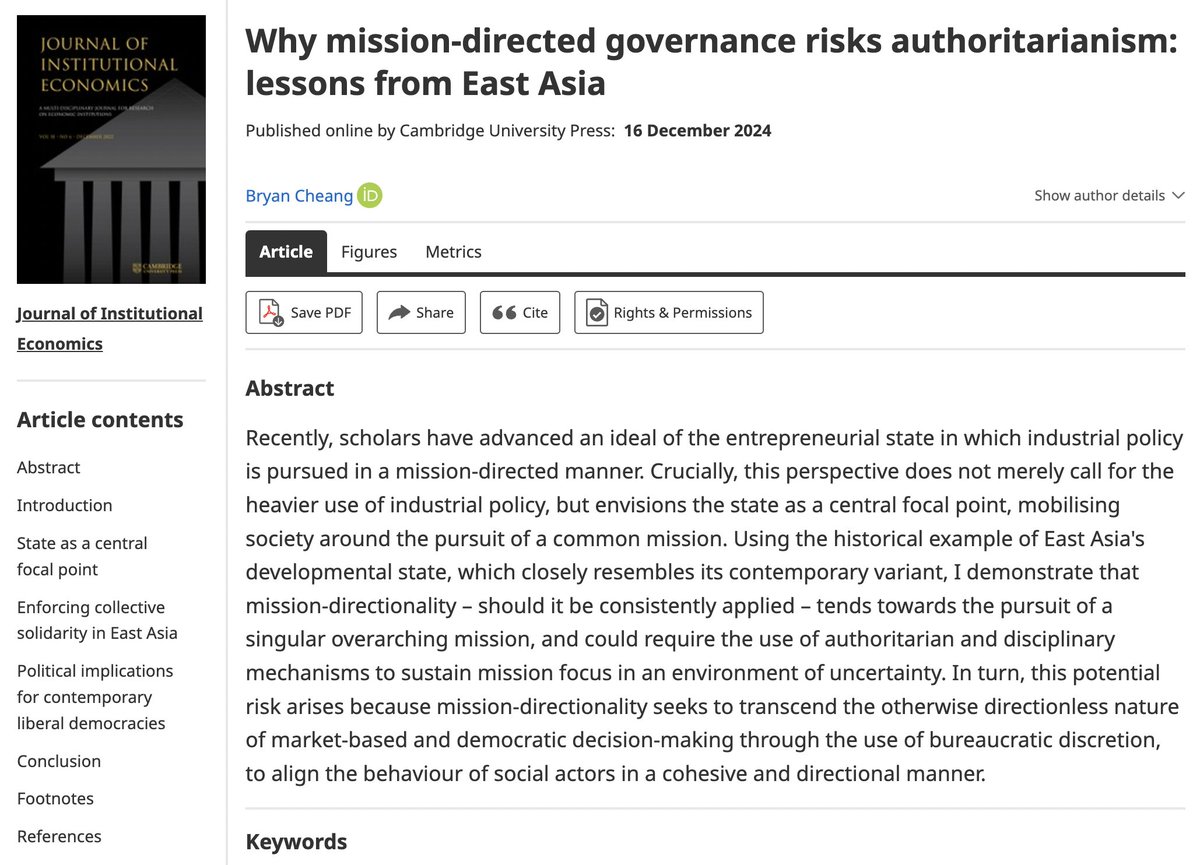
Bryan Cheang
@bryancheang_
Academic political economist from Singapore, based at @csgskcl and @sticerd_lse
1/ 🚨 Just published in Journal of Institutional Economics! 🚨 💡 My article critically examines mission-directed governance, a model increasingly touted for solving contemporary challenges in the neoliberal age. But does its logic inherently risk authoritarianism? 🤔 🧵👇

A terrific piece. I would add, even if AI develops 'creative thinking' capacities this would not support a case for AI socialism. It would imply having competition between different AIs to mimic the competition between the imaginations of entrepreneurs in 'human centred' markets.
AI Can’t Replace Free Markets by @Marian_L_Tupy and @PeterBoettke wsj.com/opinion/algori…
Looking forward to the upcoming @reason interview! Until then, don’t miss our conversation between @Kaleidicworld & @PeterBoettke on "Foucault and Liberal Political Economy." 👉mercatus.org/hayekprogram/h…
Had a fantastic conversation with @Kaleidicworld abt the overlap between Hayek & Foucault, libertarianism & postmodernism. Out in a few weeks on The @reason Interview. In the meantime, read his Foucault & Liberal Political Economy & check out his @mercatus pod w @PeterBoettke.
Had a fantastic conversation with @Kaleidicworld abt the overlap between Hayek & Foucault, libertarianism & postmodernism. Out in a few weeks on The @reason Interview. In the meantime, read his Foucault & Liberal Political Economy & check out his @mercatus pod w @PeterBoettke.
Pennington is always good value!!! He represents the best of what an intellectual should be: curious, open, and unwilling to sit always in one's corner.
What I find frustrating is that this thread is 100% right, and the FT article wildly off mark, but also not all the Nobel contributions that teach market failure, irrationality, and egalitarianism and social justice actually advance scientific understanding of the market process…
🧵 "How economics teaching became the Aeroflot of ideas" -- great title by @hajoonchang. But the content? We supposedly teach "variations of the failed theme of efficient markets", that the system is "fundamentally fair, rational, and efficient" and folks should 1/6 ➡️
🧵 "How economics teaching became the Aeroflot of ideas" -- great title by @hajoonchang. But the content? We supposedly teach "variations of the failed theme of efficient markets", that the system is "fundamentally fair, rational, and efficient" and folks should 1/6 ➡️
Really enjoyed talking to Nick and looking forward to this coming out. You don't need to buy into all of Foucault or post-modernism to recognise the overlaps between his power/knowledge concept and the Hayekian critique of scientism.
Had a fantastic conversation with @Kaleidicworld abt the overlap between Hayek & Foucault, libertarianism & postmodernism. Out in a few weeks on The @reason Interview. In the meantime, read his Foucault & Liberal Political Economy & check out his @mercatus pod w @PeterBoettke.
One of the basic mistakes socialists make is claiming that markets aren’t efficient or rational but assuming that states are—even though state actors are as fallible as market actors and have weaker incentives to make good decisions
"Economics today resembles Catholic theology in medieval Europe: a rigid doctrine guarded by a modern priesthood who claim to possess the sole truth. Dissenters are shunned. ... Neoclassical economics has become the Aeroflot of ideas." Much truth in this.
My first time on the Hayek Podcast with the one and only Peter Boettke, speaking about Foucault and Liberal Political Economy. Hope you enjoy as much as I did: tinyurl.com/ybek26ad
"The world has never seen a government more radically libertarian than @JMilei's. But the amazing thing is not that it is working economically—Adam Smith would say, 'I told you so.' The true miracle is that Milei’s shock therapy is working politically."
Politicians who claim that we should dramatically raise taxes on billionaires should first demonstrate that they can efficiently allocate the tax revenue they already have and only then call for more
Capitalism, not the state, is what ended child labor in the United States (From “Child Labor in the United States” by Robert Whaples)
In 2008, the BBC ran an article with the headline “Britons 'richer than Americans'”. Analysis from Oxford Economics found GDP per capita that year was to be £250 higher this side of the pond. Fast forward to today, and the average Brit is 40% poorer than the average American.
My colleague Mikayla offers an interesting take on how #VirginiaPoliticalEconomy might help us to understand social problems: “Social Problems: Implications for Virginia Political Economy” 2/14
Mikayla’s approach highlights the evolutionary and emergent nature of social problems, and describes how the interplay between public advocacy and political action can lead to the entrenchment or escalation of issues rather than their resolution. 14/14
Your periodic reminder that every country on the planet with high real median personal income has billionaires—the institutions that help create prosperity for all also help create billionaires
Taxing billionaires out of existence IS the moderate position
The NHS consumes vast quantities of taxpayers' money - 20% of all UK tax revenue - and is frequently used as an excuse for the imposition of even higher taxes. But its performance is consistently worse than that of other health systems.
Cheap energy saves lives, even if the green religion does not care.
A superbly crafted review of Quinn Slobodian's latest by Anthony Evans. Points out very deftly that the book has scarcely anything to do with Hayek's ideas - or even those of Mises - and should perhaps have been called 'Rothbard's Bastards.' tinyurl.com/mr3am8jx